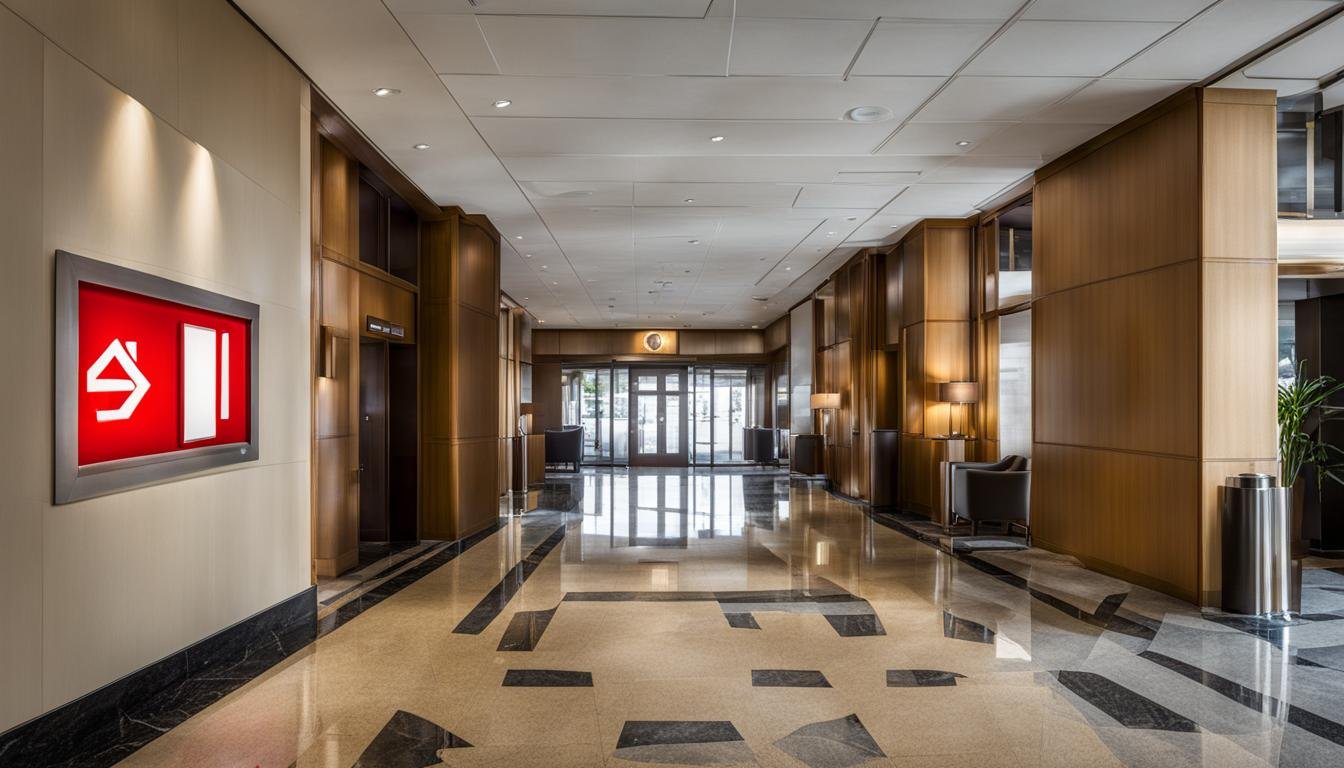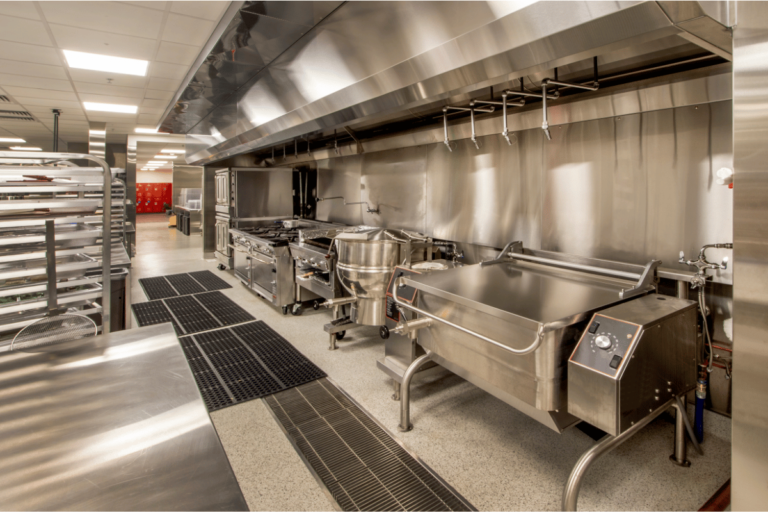Effective Emergency Response Planning in Hospitality Guide
Welcome to our comprehensive guide on emergency response planning in the hospitality industry. In today’s fast-paced world, it is crucial for hotels to be prepared for any emergency situation to ensure the safety and well-being of their guests and staff. This guide will provide you with valuable strategies and guidelines to develop an effective emergency response plan for your hotel, focusing on crisis management strategies in the hotel industry.
Key Takeaways:
- Emergency response planning is vital for the safety and well-being of hotel occupants.
- Assessing and understanding the risks is the first step in developing an effective emergency response plan.
- Fire safety measures, efficient evacuation protocols, and robust communication systems are essential components of emergency response planning.
- Collaborating with emergency responders and conducting regular drills help ensure the effectiveness of emergency response plans.
- Investing in staff training and necessary resources is crucial for successful emergency response planning.
Understanding the Risks in Emergency Response Planning
Before creating an emergency response plan for your hotel, it is crucial to assess and understand the potential risks that your establishment may face. Conducting a thorough risk assessment is the first step in developing an effective emergency response protocol for the hospitality sector. This assessment should consider both natural disasters, such as earthquakes or hurricanes, and man-made emergencies like fires or terrorist attacks.
During the risk assessment, analyze the geographical location of your hotel and evaluate its susceptibility to specific hazards. For example, if your hotel is located in an earthquake-prone area, your disaster recovery plan should include measures to reinforce structures and train staff on proper evacuation procedures.
Additionally, consider the occupancy of your hotel and identify any vulnerabilities that may impact emergency response protocols. Factors such as the number of guests, the size of the staff, and the layout of the building can all affect how efficiently and effectively you can respond to an emergency situation. By understanding these risks and vulnerabilities, you can tailor your emergency response planning to address them specifically.
For hotels in areas with a higher risk of fire incidents, partnering with professional services, such as fire watch guards in New York, can be an essential part of your emergency response strategy. These experts help monitor your premises and ensure quick action in case of a fire outbreak, adding an extra layer of safety and compliance.
“A thorough risk assessment is the foundation of effective emergency response planning in the hospitality sector.”
Table: Common Risks in Emergency Response Planning
| Risk | Description |
|---|---|
| Natural Disasters | Includes events such as earthquakes, hurricanes, floods, and wildfires. |
| Man-Made Emergencies | Includes fires, chemical spills, terrorist attacks, and civil unrest. |
| Structure Vulnerabilities | Evaluating the building’s structural integrity and identifying potential weaknesses. |
| Occupancy | The number of guests and staff present in the hotel at any given time. |
| Building Layout | Considering the design of the hotel and its impact on evacuation routes and access to emergency exits. |
By understanding the specific risks and vulnerabilities that your hotel faces, you can develop a comprehensive emergency response protocol that ensures the safety and well-being of both guests and staff.
Integrated Fire Safety Measures in Emergency Response Planning
In the realm of emergency response planning for hotels, one cannot overlook the critical importance of fire safety measures. A comprehensive fire safety system is crucial for the protection of guests, staff, and property. Here are some guidelines for implementing integrated fire safety measures in your emergency response plan:
- Install state-of-the-art fire detection and alarm systems: Utilize advanced technology to install fire detection and alarm systems that cover all areas of the hotel, including individual rooms, common spaces, and back-of-house areas. These systems should be equipped with smoke detectors, heat detectors, and manual call points to ensure early detection and prompt response.
- Incorporate fire suppression systems: In addition to detection systems, it is essential to have fire suppression systems in place. Install sprinklers in all areas of the hotel to help control and extinguish fires. Place fire extinguishers strategically throughout the property, ensuring easy access for both guests and staff.
- Design clear exit pathways: Establish well-defined exit pathways that are easily visible and accessible to all occupants. Use illuminated signage to guide individuals towards emergency exits, even in low-light conditions. Regularly inspect and maintain these exit pathways to ensure they remain unobstructed.
- Implement communication systems: Communication is key during emergencies. Incorporate effective communication systems, such as public address systems, to relay important instructions and updates to guests and staff. These systems should be tested regularly to ensure their reliability.
By incorporating these fire safety measures into your emergency response plan, you can enhance the safety of your hotel and protect against the devastating consequences of fires.
The Importance of Staff Training
Having well-trained staff is crucial for effective emergency response in hotels. All staff members should undergo comprehensive training on emergency response procedures and protocols. This includes fire safety training, evacuation procedures, and first aid training. By equipping your staff with the necessary knowledge and skills, they can respond swiftly and efficiently during emergencies, mitigating potential risks and ensuring the safety of guests and fellow employees.
Regular Inspection and Maintenance
To ensure the effectiveness of your fire safety measures, regular inspection and maintenance are essential. Establish a thorough maintenance program to assess and test all fire detection and suppression systems. Inspect emergency exits, signage, and communication systems to ensure they are in proper working condition. Additionally, conduct regular fire drills and evacuation exercises to test the response of your staff and identify areas that require improvement.
Collaboration with Local Authorities
Collaborating with local authorities is vital for emergency preparedness in hotels. Establish a strong relationship with the local fire department and other emergency responders. Seek their guidance and input during the development and review of your emergency response plan. By working together, you can ensure that your hotel’s emergency response procedures align with local regulations and best practices.
Efficient Evacuation and Egress in Emergency Response Planning
When an emergency occurs in a hotel, it is crucial to have efficient evacuation and egress protocols in place to ensure the safety of guests and staff. These protocols outline the steps that should be taken to evacuate the premises quickly and safely. In this section, we will explore the key strategies and considerations for designing effective evacuation and egress plans in emergency response planning for hospitality emergencies.
One of the first steps in designing efficient evacuation and egress protocols is to create clear and well-marked exit pathways. These pathways should be easily identifiable, preferably with illuminated signage, ensuring that occupants can navigate them even in low-light situations. By providing clear directions, guests and staff will be able to evacuate the building more swiftly, reducing the risk of injury or delay.
Another crucial aspect is considering the accessibility of emergency exits for individuals with disabilities and elderly guests. It is essential to ensure that all occupants, regardless of their physical abilities, can safely exit the premises. This may involve installing ramps or ensuring that elevators are available for those who cannot use stairs. By addressing accessibility needs in the evacuation plan, hotels can demonstrate their commitment to inclusivity and prioritize the safety of all guests.
Table: Key Considerations for Efficient Evacuation and Egress
| Consideration | Description |
|---|---|
| Clear Exit Signage | Install illuminated signage to guide occupants towards emergency exits. |
| Accessibility | Ensure emergency exits are accessible for individuals with disabilities and elderly guests. |
| Preventing Unauthorized Entry | Implement measures to prevent unauthorized entry into emergency exit areas. |
| Coordination with Emergency Responders | Establish designated assembly points in coordination with emergency responders. |
Lastly, it is important to prevent unauthorized entry into emergency exit areas. This can be achieved through measures such as installing alarms or security systems that notify staff when someone attempts to access these areas outside of an emergency situation. By safeguarding the integrity of the evacuation routes, hotels can ensure that guests and staff can exit without encountering any obstacles or potential dangers.
In collaboration with emergency responders, hotels should establish designated assembly points where evacuees can gather safely after leaving the building. These assembly points should be easily accessible and communicated clearly to all occupants. By working closely with emergency responders, hotels can facilitate a coordinated response and ensure that everyone is accounted for, enhancing the overall safety and efficiency of the evacuation process.
Efficient evacuation and egress protocols are integral components of emergency response planning in the hotel industry. By creating clear exit pathways, addressing accessibility needs, preventing unauthorized entry, and coordinating with emergency responders, hotels can enhance the safety of their guests and staff during times of crisis. The table above summarizes the key considerations for designing and implementing efficient evacuation and egress plans. By prioritizing these strategies, hotels can mitigate risks and ensure a swift and effective response in the event of an emergency.
Robust Communication Systems in Emergency Response Planning
Effective communication is essential during emergency situations in hotels. Establishing a robust communication system ensures that critical information can be relayed promptly and efficiently between hotel occupants, management, and emergency responders. By implementing the following communication strategies, hotels can enhance their emergency response planning:
- Intercom Systems: Install intercom systems throughout the hotel to enable clear and immediate communication between different areas. This allows for quick dissemination of emergency instructions and updates.
- Emergency Notification Alerts: Implement an automated emergency notification system that can send alerts to all occupants through various communication channels, such as text messages, emails, and loudspeakers. This ensures that guests and staff are promptly informed about emergency situations.
- Designated Communication Channels: Establish dedicated communication channels, such as radio frequencies or private communication apps, for effective coordination between hotel staff members and emergency responders. This facilitates real-time information exchange and enhances collaboration during crisis situations.
Training staff members on the proper use of communication systems and protocols is crucial. Regular training sessions should be conducted to ensure that all staff members are familiar with emergency communication procedures and are capable of effectively conveying critical information. Additionally, hotels should establish contingency plans for communication in the event of system failures or power outages.
“During a crisis, effective communication can make a significant difference in ensuring the safety and well-being of hotel occupants. Implementing a robust communication system is crucial for timely coordination and response.”
By prioritizing robust communication systems in emergency response planning, hotels can minimize response time, enhance coordination, and ultimately ensure the safety of their guests and staff during any emergency situation.
Collaborating with Emergency Responders in Emergency Response Planning
Building strong relationships with emergency responders is crucial in creating and implementing effective emergency response plans in the hospitality sector. By collaborating with local authorities, such as fire departments and law enforcement agencies, hotels can enhance their crisis management strategies and ensure a coordinated and timely response during emergencies.
Emergency Response Protocol for Hospitality Sector: Establishing open lines of communication with emergency responders is essential. This can be done by conducting regular meetings and training sessions to familiarize responders with the hotel’s layout, emergency procedures, and any specific risks or challenges that may be unique to the property.
“Effective collaboration with emergency responders ensures a seamless response during critical situations, minimizing potential risks and enhancing the safety of hotel guests and staff.”
During the design phase of the emergency response plan, it is important to involve emergency responders to ensure compliance with local codes and standards. This collaboration will help identify secure assembly points for evacuees and establish efficient communication channels between the hotel and emergency responders. Additionally, responders can provide valuable insights and recommendations based on their expertise and experience in crisis management.
Continual Review and Testing in Emergency Response Planning
Continual review and testing are crucial components of effective emergency response planning in the hotel industry. By regularly assessing and evaluating emergency response plans, hotel establishments can ensure that their protocols and procedures are up to date and aligned with industry best practices. Implementing a comprehensive maintenance and inspection program is essential to ensure the functionality of safety systems and equipment, such as fire detection and alarm systems, sprinklers, and emergency lighting.
Regular emergency drills should also be conducted to test the effectiveness of the emergency response plans and identify any areas for improvement. These drills provide an opportunity to assess the readiness of staff members, evaluate evacuation procedures, and identify potential bottlenecks or challenges that may arise during an actual emergency. By simulating different emergency scenarios, hotels can refine their emergency response protocols and enhance the overall safety of their occupants.
Soliciting feedback from hotel occupants is another valuable way to improve emergency response plans. This feedback can help identify any concerns or issues that may not have been previously considered and provide valuable insights for refining protocols. Additionally, it is important to stay informed about the latest developments in crisis management strategies and incorporate any relevant updates or recommendations into the emergency response plans.
Overall, continual review and testing are essential for ensuring that emergency response plans remain effective and responsive to the evolving needs of hotel establishments. By regularly reviewing, refining, and testing these plans, hotels can enhance their crisis management strategies and better protect the safety and well-being of their guests and staff.
Importance of Staff Training in Emergency Response Planning
Proper staff training is a critical component of effective crisis management in the hotel industry. By investing in comprehensive training programs, hospitality establishments can ensure that their staff members are well-prepared to handle emergencies and contribute to the overall safety of occupants. Staff training not only equips employees with the necessary knowledge and skills to respond to different crises but also instills confidence and a sense of responsibility among the staff.
Training should cover various aspects of emergency response planning, including familiarization with emergency protocols, effective communication strategies, evacuation procedures, and basic first aid. By providing staff members with thorough training on these aspects, hotels can enhance their crisis management capabilities and minimize the potential impact of emergencies. Regular training sessions should be conducted to reinforce knowledge and skills, keeping staff members up-to-date with the latest emergency response protocols.
Furthermore, staff training plays a crucial role in establishing a culture of preparedness within the hospitality industry. When employees are well-trained and confident in their abilities to handle emergencies, they can contribute to a safer and more secure environment for guests and fellow staff members. It is essential to create a positive training environment that encourages active participation and provides opportunities for staff members to practice and enhance their emergency response skills.
Key Benefits of Staff Training in Emergency Response Planning:
- Enhanced crisis management capabilities
- Prompt and effective response to emergencies
- Increased confidence among staff members
- Improved overall safety and security
- Culture of preparedness
Investing in staff training for emergency response planning is an investment in the safety and well-being of both guests and employees. By prioritizing training programs and ensuring that staff members are well-prepared, hotels can mitigate risks and effectively handle emergencies, ultimately enhancing their crisis management capabilities in the hospitality industry.
Investing in Resources for Emergency Response Planning
Investing in appropriate resources is crucial for effective emergency response planning in the hospitality industry. By allocating necessary funds and acquiring essential tools and equipment, hotels can enhance their emergency preparedness initiatives and ensure the safety of their guests and staff. Some key considerations for resource investment include:
- Emergency Response Vehicle: Investing in a dedicated business vehicle for emergency purposes can greatly improve response time and mobility during crises. This vehicle can be used to transport guests, supplies, and emergency personnel to and from the hotel.
- Emergency Kits and Supplies: Stocking emergency kits with essential items like first aid supplies, flashlights, blankets, and non-perishable food can help sustain guests and staff through an emergency situation. The availability of these supplies within the hotel ensures that immediate needs can be met efficiently.
- Communication Devices: Equipping staff with reliable communication devices, such as two-way radios or mobile phones, enhances coordination and enables prompt dissemination of critical information during emergencies. These devices should have a reliable network and be easily accessible to all relevant personnel.
- Backup Power Sources: In the event of power outages, having backup power sources, such as generators or uninterruptible power supply (UPS) systems, is vital for maintaining essential services and equipment functionality. This ensures uninterrupted communication, emergency lighting, and operation of critical systems.
By investing in these resources, hotels can strengthen their emergency response capabilities and effectively handle various scenarios that may arise.
Conclusion
Emergency response planning is a vital component of ensuring the safety and well-being of both guests and staff in the hospitality industry. By implementing effective strategies and protocols, hotels can effectively manage crises and mitigate risks. By understanding the potential risks, such as natural disasters and man-made emergencies, hotels can tailor their emergency response plans to specific vulnerabilities.
Fire safety measures, including the installation of state-of-the-art alarm systems and clear exit pathways, are essential to a comprehensive emergency response plan. Efficient evacuation and egress protocols, coupled with robust communication systems, facilitate the safe evacuation of occupants during emergencies.
Collaborating with emergency responders and continually reviewing and testing emergency response plans are key to ensuring their effectiveness. Proper training of staff members and investing in resources, such as emergency vehicles, further enhance emergency preparedness in the hotel industry.
By prioritizing emergency response planning and incorporating these strategies, hotels can effectively manage crises, safeguard lives, and maintain the highest level of safety for everyone within their establishments.
Source Links
- https://dem.nv.gov/uploadedFiles/demnvgov/content/Resources/Nevada Resort Hotel ERP Guide Final Draft 5.11.2018.pdf
- https://insights.ehotelier.com/insights/2023/03/01/how-to-create-an-emergency-plan-for-your-hotel/
- https://www.linkedin.com/pulse/importance-emergency-preparedness-hotel-multifamily-building







